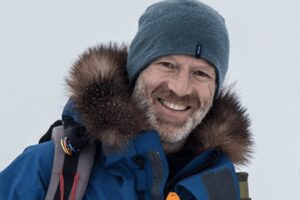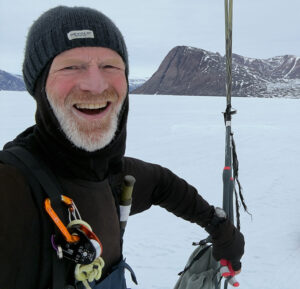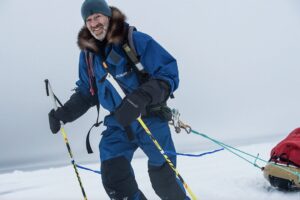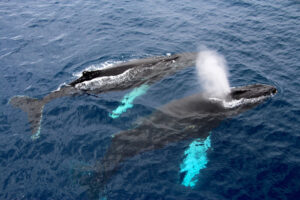With no new expeditions starting because of COVID-19, the arctic season has come to a very premature end. In Siberia, the last two men on the ice finished their Lake Baikal crossings. Meanwhile, in the Canadian Arctic, the two expeditions that started before the lockdowns have ended prematurely.
Lake Baikal
Oli France (GBR) and Roland Banas (France) both completed their crossings of the lake on March 20. France covered the 657km from Kultuk to Nizhneangarsk in 16 days, while Banas did it in a little over 15 days.

Oli France, all smiles at the end of his Lake Baikal crossing. Photo: Oli France
Denali via the Canadian Arctic
Since setting off on February 29, Matthieu Bélanger and Loury Lag of France struggled in the harsh Canadian Arctic, and their pace was much slower than anticipated.

Matthieu Bélanger and Loury Lag in the Canadian Arctic. Photo: Team Icarus
By March 20, Bélanger had become snowblind and was in the tent, trying to recover. Unfortunately, his eye problems became too severe, and they had to contact emergency services in Kugaaruk for medical advice. At this point, the police notified them that they were breaking emergency COVID-19 laws by moving between Inuit settlements and that if they continued they would be arrested and deported.
Even if they had been able to continue, they would not have completed their mission of climbing Denali, since the mountain has been shut down because of the pandemic. They are now both back in France and hope to attempt this part of their Icarus project again in future.
Three months solo in Arctic Canada
Japanese explorer Yuki Sekiguchi began the third winter of his four-year solo traverse of northern Canada on February 1. This winter, he planned to ski the 1,500km from Great Bear Lake to Gjoa Haven. He said that he would not use any communication device except in an emergency, and so everyone thought that no news was good news. Unfortunately, this was not the case.

Yuki Sekiguchi tackles soft snow on Great Bear Lake. Photo: Yuki Sekiguchi
When he arrived at the village of Deline in the Northwest Territories, he discovered a lot more soft snow than he expected. He added an extra 10 days of fuel and food to this first stage of his journey, so that he now toted 55 days supplies in all. When he set off from Deline across Great Bear Lake toward the Arctic Ocean, his sled weighed 130kg — a reasonable weight on windpacked snow but an abomination in unconsolidated powder.

Stymied by soft snow and slow going, Yuki Sekiguchi turned back. Photo: Yuki Sekiguchi
Progress through the soft surface was usually a grinding 1km an hour and about 10km a day at best. Whiteouts delayed him further. After three weeks at this pace, he knew he would not be able to make it across the lake. Rather than use his emergency communication device, he began the long, discouraging trudge back to Deline. He reached it 38 days after he first set out.
Sekiguchi is now back in Japan. The experience “taught me how weak I am, and that adventure is a great experience and an important act,” he reflects. Undeterred, he plans to tackle his traverse again next year.






